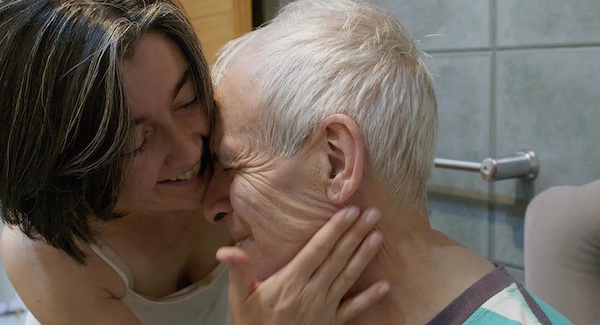Doc Talk: Two at CineFest Latino Boston — Totaled Recall
By Peter Keough
What happens when, through unwillingness or incapacity, memory is lost or forsaken? Two documentaries at the CineFest Latino Boston explore some answers.

Nikki Giovanni in a scene from Going to Mars: The Nikki Giovanni Project.
Memory is essential for the sake of truth, justice, and identity. But what happens when, through unwillingness or incapacity, memory is lost or forsaken? This question is explored in two documentaries at the first annual CineFest Latino Boston (at the Museum of Fine Arts, the Coolidge Corner Theatre, and other venues September 27-October 5).
At the start of Michèle Stephenson and Joe Brewster’s inventive and impressionistic Going to Mars: The Nikki Giovanni Project (2023; screens October 1 at 5:30 p.m. at the Coolidge Corner followed by a Q & A with the directors), the poet of the title says, “I don’t remember a lot of things. But a lot of things I don’t remember I don’t choose to remember. I remember what’s important and make up the rest.”
One of those occasions of willful forgetting occurs later in the film when she participates in a Q & A. In an oddly “gotcha” moment, a member of the audience asks Giovanni where she was on April 4, 1968 — the day Martin Luther King Jr. was assassinated. Giovanni freezes and says, “I don’t know.” People in the audience titter, but when the questioner follows up by asking, “How did that day affect you?” she says, “I’m sure it’s a good question but … I’ve already answered it. I can’t take it any further.”
Indeed she had answered the question before — in her brutal poem “April 4, 1968,” written the day after the murder. It begins, “What can I, a poor Black woman, do to destroy america?” What follows is a litany of fantasized violence against the perpetrators of that atrocity and others throughout American history — assassinations, lynchings, bombings, police brutality and murders.
As Eliot wrote, “After such knowledge, what forgiveness?” After the impotent rage and the subsequent numbness, after the frustrations of torturous progress and disastrous reversals, despite the palliatives of tenderness, humor, and metaphor, what refuge remains? In the poem “Quilting the Black-Eyed Pea (We’re Going to Mars)”– which lends the film its title — Giovanni puckishly suggests space travel as an option, maybe as a 21st-century alternative to Marcus Garvey’s “Back to Africa” campaign. In it, she writes that because of the experience of the Middle Passage, “The trip to Mars can only be understood by Black Americans” and that
“…there reached a point where the captured could not only
look back
they had no idea which way ‘back’ might be
there was nothing in the middle of the deep blue water
to indicate which way home might be and it was that
moment … when the decision had to be made:
Do they continue forward with a resolve to see
this thing through or do they embrace the waters
and find another world…”
Memories of male violence also are a tricky subject. Throughout the film, sometimes in bitterness, sometimes in jest, she refers to her father’s abuse of her mother. In clips from an interview she did with James Baldwin in 1971, she describes how her father would come home after being demoralized and belittled by white oppression and take it out on his wife. “I don’t like white people and I’m afraid of Black men,” she confesses to Baldwin. But when one of the filmmakers asks her for more details about her childhood experiences of this domestic trauma she says, “You want something I’m clearly not ever going to give you or anybody else so you can find another question.”
In a more forthcoming moment, Giovanni, shedding tears, explains to the filmmaker why she has such ambivalence about delving into these matters. “I’m learning to let it go,” she says. “I don’t have to be strong or brave. I don’t have to do anything for anybody. I educated my son. I paid for my house. My car is paid for. I can live my life as I fucking well please.”
And so she has for some 79 years now, a life Going to Mars distills into a cinematic poem that succeeds more often than not. With its sometimes dazzling, sometimes opaque collagist style, intercutting past and present, mixing images of space travel with archival footage of the Civil Rights Movement, alternating scenes of Giovanni at various ages reciting her poems and speaking her mind, it evokes the poetic imagination and mirrors the process of memory itself.
Chilean history has its share of bitter ironies but few more tragic than that of Augusto Góngora, the crusading journalist and activist. Co-author of Chile: The Forbidden Memory (1989), the monumental account of the crimes committed by the Augusto Pinochet dictatorship, Góngora himself would in the end have his own memories erased — he was diagnosed with Alzheimer’s in 2014 and died from it in May at 71.

Paulina Urrutia and Augusto Góngora in The Eternal Memory. Photo: MTV Documentary Films
Directed with effusive, loving intimacy by Maite Alberdi, The Eternal Memory (2023; screens September 29 at 7 p.m. at the MFA) shares Góngora’s last years spent with his longtime partner, the actress and former president of the Chilean National Council of Culture and the Arts Paulina Urrutia (they were married in 2016 and had been together for over 20 years). It opens with Góngora waking up in his idyllic home and Paulina lovingly asking him questions about where he is, who she is, and who he is. Her husband, equally loving, unalarmed, gradually arrives at the correct answers. It seems like a lovers’ game, but it becomes clear that it is in earnest and a regular occurrence.
The initial playfulness inexorably declines into the disease’s latter stages and Góngora’s good-natured confusion deteriorates into panic, anger, grief, tears, and terror. Flashbacks to the past in the form of archival footage help remind him of who he was and what he accomplished. More importantly, it also demonstrates how his memory is also that of his country. Góngora and his broadcasts persistently reminded listeners prone to amnesia of the country’s history of tyranny and repression, insisting on the need to restore justice and achieve reconciliation.
In one uncanny segment the couple recall how Góngora played a role in surrealist Chilean director Raúl Ruiz’s film Days in the Country (2004). It’s the story of a writer who takes a break to sort out a long gestating project and as he does so he is visited by memories of people from his past, some of whom are apparently dead. Góngora plays one of the deceased visitors. “You were terrible,” says Urrutia and a clip from his performance suggests that she is correct.
But Ruiz, as Góngora is reminded, is also dead now. As are many of those whom he knew during the struggle to rid Chile of its poisonous past. In one of the film’s more disturbing sequences, Góngora and Urrutia watch some of his broadcasts of demonstrations against the regime. She says it is good for him to remember what he has accomplished. He agrees, but his mood darkens when he recalls how many were killed. The fate of one in particular, a friend who had his throat slit as a warning to others, brings tears to his eyes.
As his illness progresses, it seems the worst recollections will be the last to go. Though no longer forbidden, in some ways, perhaps, his memory has become a curse.
Peter Keough writes about film and other topics and has contributed to numerous publications. He had been the film editor of the Boston Phoenix from 1989 to its demise in 2013 and has edited three books on film, most recently For Kids of All Ages: The National Society of Film Critics on Children’s Movies (Rowman & Littlefield, 2019).
